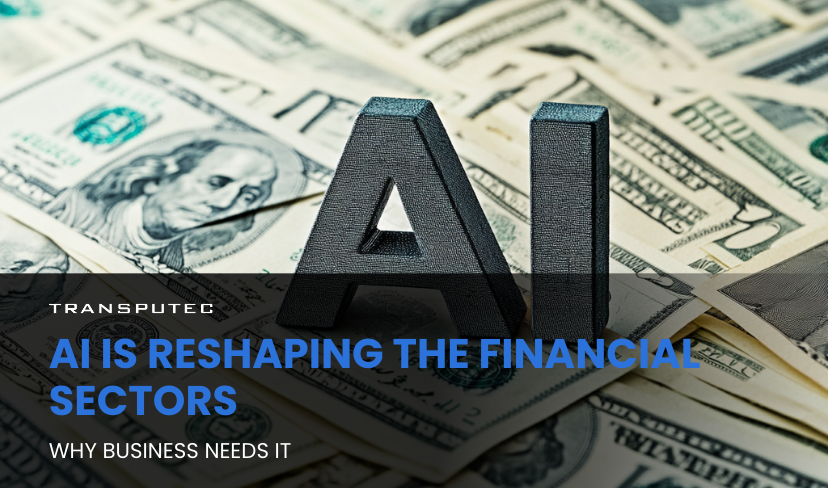Written by KRITIKA SINHA | MARKETING
When fraud detection lags behind attackers, customer service lines are overwhelmed, and risk predictions fall flat, the costs are not just financial—they’re reputational. Many financial institutions, from banks to fintech startups, struggle daily with outdated legacy systems, inefficient processes, and a growing demand for hyper-personalisation. Business owners face sleepless nights worrying about compliance errors, while employees are often buried under repetitive, manual tasks that stifle innovation.
This blog addresses these pressing concerns by exploring a transformative solution: AI is Reshaping the Financial Sectors. We’ll break down how artificial intelligence is driving smarter decisions, improving customer experiences, and streamlining operations, while showcasing how companies like Transputec are helping businesses successfully adopt and scale AI initiatives. Expect insights backed by data, practical use cases, and expert commentary.
AI is Reshaping the Financial Sectors: The Data-Driven Revolution
AI is reshaping the financial sectors at an unprecedented pace, moving from isolated experiments to the core of how institutions operate. According to Gartner, nearly 60% of banking CIOs have already deployed AI-based tools or plan to do so within the next year. The global market for AI in finance, valued at $9.45 billion just two years ago, is projected to nearly triple by 2030. This rapid adoption is driven by the tangible benefits AI brings:
- Efficiency gains: Automating manual tasks saves time and reduces costs.
- Risk reduction: AI’s predictive power improves fraud detection and compliance.
- Customer satisfaction: Personalised services and 24/7 support boost loyalty.
Let’s examine the most transformative ways AI is reshaping the financial sectors.
AI is Reshaping the Financial Sectors
1. Fraud Detection & Risk Management
Fraud and risk are constant threats in finance, but AI is reshaping the financial sector by revolutionising how these challenges are tackled. AI-powered systems can analyse millions of transactions in real time, identifying unusual patterns that signal fraud, often before it occurs. For example, Hawk AI recently secured $56 million in funding for its compliance-focused fraud detection platform, underlining the sector’s commitment to AI-driven security.
Machine learning models also excel at risk assessment. By analysing both traditional and alternative data sources, AI provides more accurate credit scoring and real-time risk analysis, even incorporating volatile factors like fluctuating interest rates. This enables lenders to make smarter decisions and proactively manage systemic risks.
2. Customer Experience & Personalisation
AI is reshaping the financial sector by transforming customer interactions. Virtual assistants and chatbots handle routine queries 24/7, delivering instant support and freeing staff to focus on higher-value work. Bank of America’s Erica, for example, has managed over 800 million customer queries, providing 1.2 billion pieces of financial insight.
But AI goes beyond automation. By analysing customer behaviour and preferences, AI enables hyper-personalised recommendations—whether it’s suggesting investment products, optimising loan offers, or delivering tailored financial advice. This personalisation not only improves customer satisfaction but also drives revenue growth.
3. Operational Efficiency & Automation
Manual processes are a major bottleneck in finance. AI is reshaping the financial sectors by automating everything from loan processing to regulatory reporting. This not only accelerates workflows but also reduces human error and operational costs.
Loan processing: AI streamlines risk assessment, credit scoring, and document verification, enabling faster approvals and better customer experiences.
Compliance: AI automates monitoring and reporting, ensuring institutions stay ahead of evolving regulations and avoid costly penalties.
4. Investment & Trading
Algorithmic trading is another area where AI is reshaping the financial sector. AI models can analyse market trends and execute trades with speed and precision that humans can’t match. Tools like TheAnalystAI deliver deep, actionable insights across asset classes in minutes, enabling firms to optimise investment strategies and respond to market changes in real time.
Portfolio management: AI analyses economic indicators and market conditions, helping investors make informed decisions and maximise returns.
Sentiment analysis: By scanning news and social media, AI gauges market sentiment, influencing trading strategies and risk management.
5. Compliance & Regulatory Reporting
Staying compliant is a never-ending challenge in finance. AI is reshaping the financial sectors by simplifying and automating compliance tasks. Generative AI models can forecast compliance needs, validate control postures, and reduce the manual effort involved in governance.
Example: Generative AI helps institutions align with regulations like NIST, PCI DSS, and the new Digital Operational Resilience Act, coming into force in 2025.
The Benefits of AI in Financial Services
The adoption of AI in the financial sector offers numerous benefits, including increased efficiency, cost savings, and improved decision-making. AI is reshaping the financial sector by automating repetitive tasks, reducing the need for manual intervention, and enabling institutions to process large volumes of data quickly and accurately.
For example, AI can automate back-office operations such as data entry, reconciliation, and reporting, freeing up employees to focus on higher-value tasks. This not only improves productivity but also reduces operational costs. Additionally, AI-driven analytics can provide valuable insights into customer behaviour, market trends, and financial performance, enabling institutions to make data-driven decisions and stay competitive in the market.
How Transputec Helps
Transputec is at the forefront of AI innovation, offering a range of AI solutions tailored to the financial sector. Our AI-powered tools and services are designed to help financial institutions enhance their operations, improve customer service, and stay compliant with regulatory requirements.
Our solutions include AI-driven fraud detection, customer service chatbots, risk management tools, and compliance automation. By partnering with Transputec, financial institutions can leverage the power of AI to transform their operations, reduce costs, and stay ahead of the competition.
Conclusion
In conclusion, AI is reshaping the financial sectors by offering innovative solutions to some of the industry’s most pressing challenges. From fraud detection and customer service to risk management and regulatory compliance, AI is driving significant improvements in efficiency, security, and decision-making. As the financial industry continues to evolve, the adoption of AI will be crucial for institutions looking to stay competitive and meet the demands of their customers.
If you are ready to harness the power of AI and transform your financial operations, contact Transputec today. Our team of experts is here to help you get started and ensure that you achieve your business goals with our cutting-edge AI solutions.

Ready to Unlock the Full Potential of AI in Financial Sectors?
Connect with an expert and get started on the next generation of IT support.
FAQs
1. What is AI and how is it reshaping the financial sectors?
AI, or Artificial Intelligence, refers to the simulation of human intelligence by machines. It is reshaping the financial sectors by automating processes, enhancing decision-making, and improving security and customer service.
2. How does AI improve fraud detection in the financial industry?
AI improves fraud detection by using machine learning algorithms to analyze large volumes of data in real-time, identifying patterns and anomalies that may indicate fraudulent activity. This proactive approach enhances security and reduces the time and resources spent on manual reviews.
3. What role does AI play in customer service for financial institutions?
AI plays a significant role in customer service by providing AI-powered chatbots and virtual assistants that offer 24/7 support, answer queries, and assist with transactions. This improves customer satisfaction and frees up human agents to focus on more complex tasks.
4. How can Transputec help financial institutions with AI solutions?
Transputec offers a range of AI solutions tailored to the financial sector, including fraud detection, customer service chatbots, risk management tools, and compliance automation. Our solutions help financial institutions enhance their operations, reduce costs, and stay compliant with regulatory requirements.
5. What are the benefits of adopting AI in the financial sector?
The benefits of adopting AI in the financial sector include increased efficiency, cost savings, improved decision-making, enhanced security, and better customer service. AI automates repetitive tasks, processes large volumes of data quickly and accurately, and provides valuable insights for data-driven decision-making.







